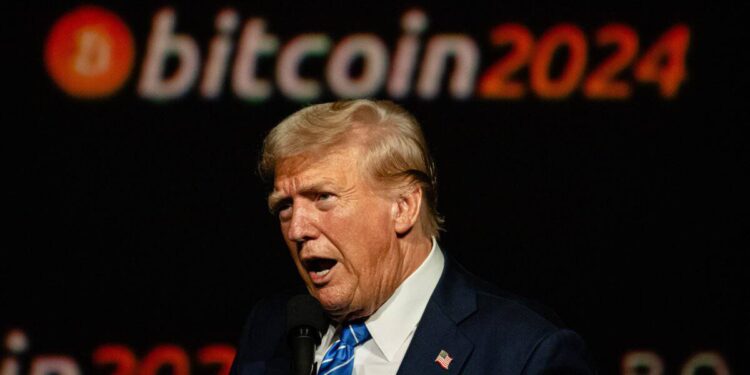Trump’s big move on his first day in office: issued an order to “buy Bitcoin reserves”?
 summary:
Trump’s big move on his first day in office: issued an order to “buy Bitcoin reserves”?The...
summary:
Trump’s big move on his first day in office: issued an order to “buy Bitcoin reserves”?The... Trump’s big move on his first day in office: issued an order to “buy Bitcoin reserves”?
The U.S. Strategic Bitcoin Reserve Plan: A Turning Point for Digital Asset Policy?
As the cryptocurrency market continues to evolve, Bitcoin, the world’s most prominent digital asset, has solidified its status not only among private investors but also within the purview of governments and policymakers. Recently, discussions surrounding the establishment of a U.S. strategic Bitcoin reserve have gained momentum, driven by proposals from digital asset advocates, senators, and some political leaders. If such a policy comes to fruition, it could redefine the composition of national monetary reserves and bring profound changes to the global economic and financial systems.
The Origin of the Bitcoin Reserve Plan: Senator Cynthia Lummis’ Proposal
In early 2024, U.S. Senator Cynthia Lummis introduced a noteworthy bill proposing that the U.S. Treasury and Federal Reserve (Fed) purchase 200,000 Bitcoins annually over the next five years, reaching a reserve scale of 1 million Bitcoins. This quantity accounts for roughly 5% of Bitcoin's current total supply, which would have a significant impact on the supply-demand structure of the Bitcoin market.
The rationale behind this proposal lies in Bitcoin’s role as a decentralized and scarce asset, offering similar safe-haven properties as gold. With increasing global inflation and central banks continuously issuing fiat currencies, the purchasing power of fiat money has come under scrutiny. As a result, Bitcoin, often referred to as "digital gold," is being increasingly viewed as a potential national-level financial strategic tool.
Trump’s Support and the Potential for an Executive Order
In addition to Cynthia Lummis’ proposal, former U.S. President Donald Trump’s stance on the Bitcoin reserve plan has drawn significant attention. According to Jack Mallers, founder of the well-known Bitcoin payment platform Strike, Trump is considering signing an executive order to officially launch a strategic Bitcoin reserve plan on his first day back in office.
Jack Mallers revealed that while the plan may not immediately achieve the substantial target of 1 million Bitcoins, its symbolic significance would be immense, signaling formal U.S. government acceptance of Bitcoin as a strategic reserve asset. This statement has fueled market expectations regarding the future of U.S. cryptocurrency policy.
Trump himself expressed interest in cryptocurrencies during his appearance at the New York Stock Exchange in May 2024. Speaking to financial media outlet CNBC, he said, “We will do great things with cryptocurrencies.” When asked about the possibility of establishing a Bitcoin strategic reserve akin to the petroleum reserve, Trump responded affirmatively, showcasing his support for Bitcoin as part of the national strategic reserve.
The Potential Impacts of a U.S. Bitcoin Reserve
If the U.S. were to initiate a strategic Bitcoin reserve plan, it would generate far-reaching effects, not just domestically but also globally.
Reshaping Monetary Reserve Structures
For decades, gold and foreign exchange reserves have been critical assets for central banks to stabilize national economies. As “digital gold,” Bitcoin offers scarcity, decentralization, and immutability, giving it clear advantages over traditional reserve assets. If the U.S. leads in incorporating Bitcoin into its reserves, it could inspire other nations to follow suit, driving Bitcoin’s integration into the global financial system.
Boosting Bitcoin Prices
Bitcoin’s total supply is capped at 21 million. If the U.S. government aggressively purchases Bitcoin, it would substantially reduce market supply, driving up prices. This would attract more investors into the market, further increasing its momentum.
A Milestone for Cryptocurrency Legalization
The U.S. government’s proactive stance would signal high recognition of Bitcoin’s legitimacy and stability, greatly improving the regulatory environment for cryptocurrency markets. This would facilitate the legal and compliant development of digital assets, transitioning Bitcoin from a speculative tool to a mainstream financial asset.
The U.S. Financial Strategic Advantage
In the competitive landscape of international economics, early adoption of Bitcoin as part of the reserve system could position the U.S. at the forefront of digital finance. Bitcoin’s decentralized nature makes it resistant to manipulation by any single nation, helping the U.S. maintain a competitive edge in the global financial system, especially amidst emerging economies and geopolitical risks.
Driving Technological Innovation
Bitcoin and its underlying blockchain technology would gain greater attention from both the U.S. government and enterprises, driving innovation in digital finance, payment systems, and decentralized applications. This would encourage broader acceptance of Bitcoin as a payment tool and foster digital economic growth.
Challenges of the Bitcoin Reserve Plan
Despite the widespread attention, the proposal to establish a strategic Bitcoin reserve faces significant challenges, including:
Policy and Regulatory Hurdles
Digital asset regulation in the U.S. remains incomplete. Determining how to legally and appropriately incorporate Bitcoin into national reserves requires thorough discussions and legislation.
Bitcoin Price Volatility Risks
The Bitcoin market remains highly volatile, posing substantial market risks if the government adopts it as a reserve asset. This volatility is one of the main concerns raised by critics.
Integration with the Traditional Financial System
Bitcoin’s decentralized nature presents challenges in harmonizing it with traditional financial systems. Finding a balance between the two will be a key hurdle.
Market Supply Shortages
If the U.S. government were to purchase Bitcoin on a large scale, it could exacerbate supply shortages in the market, potentially triggering panic buying and liquidity issues.
The Future of U.S. Bitcoin Policy
Despite the challenges, the concept of a U.S. strategic Bitcoin reserve marks a significant milestone in cryptocurrency’s development. With political figures such as Trump and Cynthia Lummis showing strong support for Bitcoin, it could become a core component of future national policies, ushering in a new era for digital assets.
Key Tags: Bitcoin Reserve, U.S. Policy, Cynthia Lummis, Bitcoin Bill, Trump Executive Order

